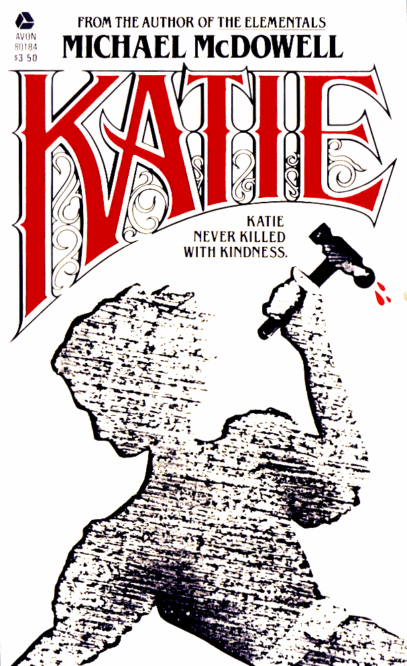 By MICHAEL McDOWELL (Avon; 1982)
By MICHAEL McDOWELL (Avon; 1982)
This in my view is the least of Michael McDowell’s novels. KATIE is solidly drafted and ambitious, as I’d expect from McDowell, and contains many good—sometimes great—elements, but never coalesces into a satisfying whole.
Among the great elements is the title character, a murderess possessed of a not-inconsiderable intellect that’s enhanced by telekinesis. Katie is the youngest member of the Slape family, an evil clan residing in Northeastern America in the years following the Civil War. This brings up another standout element: the period detail, which MacDowell employs with conviction and admirable restraint (meaning that, unlike many other historical novelists, he refrains from interrupting the narrative to show off his research).
The not-so-great things include the too-pure-to-be-believed protagonist Philo Drax. An impossibly virtuous young woman hailing from a poor family, Philo is spurred into action by a letter from her wealthy invalid grandfather, whose stepdaughter Hannah has become Katie’s stepmother. Katie and her parents, it seems, are scheming to kill Philo’s grandfather and take his money, inspiring Philo to travel to his New Jersey home (with Philo, and McDowell, taking pains to point out that she’s concerned with the old man’s well-being and not his fortune). There she poses as a servant and conspires with granddad to free him from the Slapes’ grasp, but Katie kills the old man before that can occur and pins the crime on Philo.
The Slapes decamp to New York, where they install Katie as a fortune teller. In this guise she uses her psychic abilities to discern whether her clients have money stashed away, and if so kills them for it. Philo follows in the Slapes’ footsteps, and in so doing finds solace and romance, and undergoes the inevitable climactic confrontation with Katie.
Given that Katie is the best thing about this novel, and that it’s named after her, the character is shockingly underdeveloped. Her psychic powers are underutilized, on hand largely to smooth over farfetched plot points (such as how the Slapes are to discern the true identity of their servant and the financial backgrounds of Katie’s victims), and her ultimate demise, in common with the ending overall, is shockingly staid and undramatic. That’s a shame, as she’s one of the greatest villains in the oeuvre of an author who created more than his share of great villains.
McDowell claimed his major inspiration was the penny dreadful mode of writing that proliferated in 19th Century Britain. KATIE also partakes of the bodice-ripping historical romance model popular in the 1970s and 80s; the book’s initial publisher Avon, as it often did with horror fare, put this book out with romance novel packaging that for once wasn’t entirely inappropriate.
